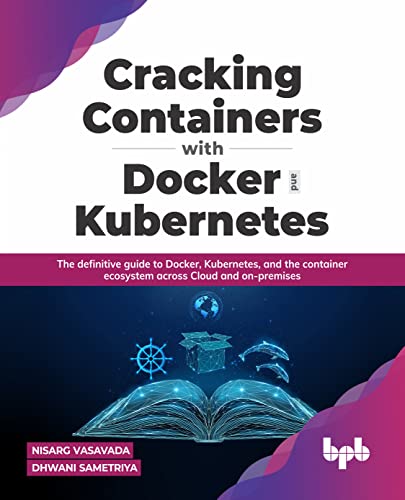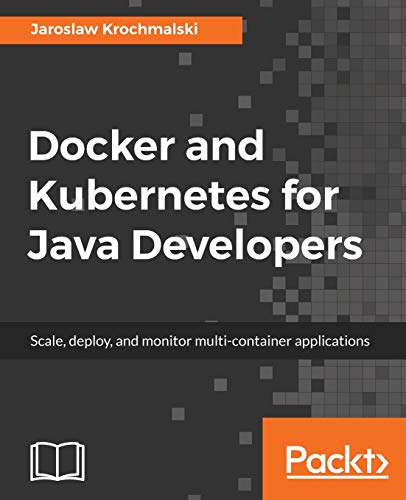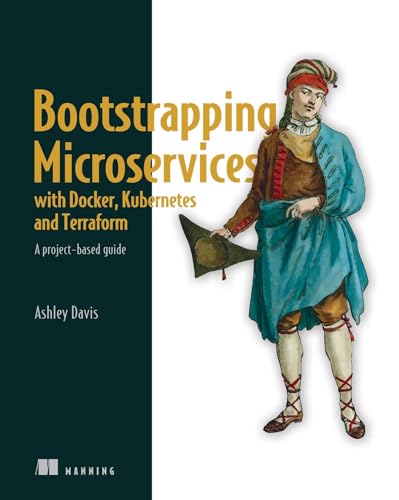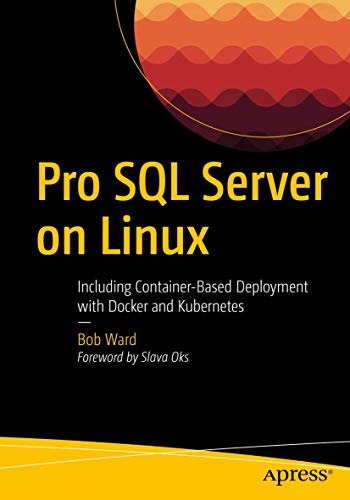10 Best Selling Docker Books (Updated Daily)
The list of Docker books below is for beginners and advanced sysadmins and engineers.
- Dr. Gabriel N. Schenker (Author)
- English (Publication Language)
- 626 Pages - 08/31/2023 (Publication Date) - Packt Publishing - ebooks Account (Publisher)
- Vasavada, Nisarg (Author)
- English (Publication Language)
- 534 Pages - 12/07/2021 (Publication Date) - BPB Publications (Publisher)
- Kane, Sean P. (Author)
- English (Publication Language)
- 416 Pages - 05/23/2023 (Publication Date) - O'Reilly Media (Publisher)
- Weil, Arnaud (Author)
- English (Publication Language)
- 228 Pages - 01/30/2020 (Publication Date) - Lulu Press, Inc. (Publisher)
- Amazon Kindle Edition
- Poulton, Nigel (Author)
- English (Publication Language)
- 425 Pages - 09/19/2016 (Publication Date)
- Krochmalski, Jarosław (Author)
- English (Publication Language)
- 318 Pages - 08/30/2017 (Publication Date) - Packt Publishing (Publisher)
- Ortega Candel, José Manuel (Author)
- English (Publication Language)
- 460 Pages - 02/22/2022 (Publication Date) - BPB Publications (Publisher)
- Davis, Ashley (Author)
- English (Publication Language)
- 440 Pages - 03/09/2021 (Publication Date) - Manning (Publisher)
- Ward, Bob (Author)
- English (Publication Language)
- 632 Pages - 10/28/2018 (Publication Date) - Apress (Publisher)
- Aversa, Luigi (Author)
- English (Publication Language)
- 420 Pages - 05/31/2023 (Publication Date) - BPB Publications (Publisher)
BONUS: Before you leave here are some important statistics for you…
If you here looking for the best Docker book to study to future proof your skills – that’s a good idea.
Here’s why…
Docker statistics show that we can expect container technology growth to continue unabated.
In fact, global revenue for containers and container-related technologies is expected to grow at a compound annual rate of 18%, reaching $13.7 billion in 2022.
And this doesn’t even account for other components in the ecosystem such as orchestration tools like Kubernetes and Mesosphere DC/OS. They’re forecasted to reach $6 billion by the end of 2021 and continue growing for years to come. Read more…
As these numbers illustrate, Docker has established itself as an important player in today’s IT landscape. And in order for any organization looking to stay competitive with their peers or simply keep up with the latest technology trends, they need a clear strategy around Docker.
If you need some more facts on why you should care about this container thing check out our blog post where we discuss some of the benefits of putting Docker on your tool belt. But today I am going to talk about why you should start your Docker training now.
Now, this is where I’m going to discuss a few benefits of learning Docker. Also, when you’re done reading, you might also want to check out the link above for Docker training while you still can get an early adopter’s advantage.
1) Early Adopters Have More Time To Potentially Gain Competitive Advantage
As I mentioned above, Docker is changing how traditional admin skills are being used. If you’re one of the few that already have experience with managing containers then this will give you a leg up on your peers if they don’t have comparable knowledge.
2) Early Adopters Have Less Risk Of Falling Behind Competitors If They Know What To Expect
Every industry has its own unique challenges. For example, in the financial services industry, it is common for organizations to need to conform to extremely high-security requirements because of the sensitive nature of their data. Couple this with increased government regulation and you have a recipe for disaster if you are not prepared. One area where Docker stands to have a great impact is in the storage industry. If you are an early adopter of Docker then there is a good chance that you will be able to work through security challenges faster than your peers because you would already be exposed to containers and how they work on a smaller scale.
3) Early Adopters Have More Time To Prepare For How Their Competitors Are Adopting Docker
One way to gain a competitive advantage is by understanding how your peers are using new technology like Docker. If you were an early adopter of Docker then this will give you critical information that can help you better prepare for changes in the future and build a strategy around them.
4) Early Adopters Are More Likely To Gain Early Access To New Features
As Docker’s customer base continues to grow, so too will the product they are offering. If you adopt early you’ll have more opportunities to get access to new features before your peers which gives you a potential advantage over them.
5) Early Adopters Will Have More Opportunities To Potentially Influence The Direction Of Docker
As more organizations start to adopt Docker, the more it is likely that they’ll begin to voice their opinions on how this technology could be improved. If you were an early adopter then there’s a good chance that your opinion will carry more weight than those coming in later with less experience.
I know there are a lot of other great reasons to learn Docker but I’ll leave it here for now. If you have some other thoughts on why being an early adopter is a good idea then I encourage you to share them in the comments below.
Now go find a Docker book and let me know how it goes!
Do you have a favorite Docker book you’d like to recommend to our community?
Please feel free to share your book suggestion through the comments section below.
And to further your learning, we also suggest this list of related Books about DevOps and Network Security Books for Beginners.
vbeginners.com is a participant in the Amazon Services LLC Associates Program, an affiliate advertising program designed to provide a means for sites to earn advertising fees by advertising and linking to Amazon.com, Amazon.co.uk, Amazon.ca, and other Amazon stores worldwide. *Best Sellers last updated on 2025-04-03 at 02:29.









